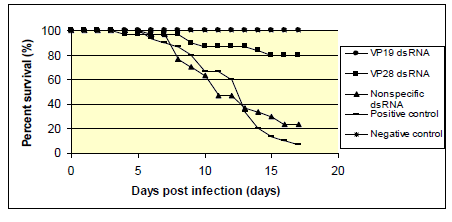Introduction
White Spot Syndrome Virus (WSSV) can cause 100 % mortality within 7-10 days resulting in the huge economic loss in shrimp farming. The aim of this study was to test novel means of protecting the Pacific white shrimp, Litopenaeus vannamei, against disease caused by WSSV. Double-stranded RNA (dsRNA) is a hallmark of viral infection which responds to the immune system of shrimp by RNA interference (RNAi) pathway. Mechanistically this was done by testing RNAi through exposure to doublestranded RNA targeting virus protein VP19, VP28.
Materials and Methods
Specific Pathogen Free (SPF) juvenile L. vannamei weighing 3-5 grams were acquired from Shrimp Improvement Systems (SIS) and were acclimated into 200L tanks containing synthetic seawater. Animals were divided into 5 groups with 3 replicates per group and 10 animals per tank.
Shrimp were injected with 5 micrograms of dsRNAVP19, dsRNAVP28, a non-specific dsRNA, or an equivalent volume of 2% sterile saline. Shrimp were challenged 3 days later with a lethal dose of WSSV by intramuscular injection into the third abdominal segment using a previously clarified and diluted tissue homogenate positive for WSSV by Real Time Quantitative PCR. Mortalities were recorded for 17 days.
Results and Discussion
After 17 days post challenge, VP19 dsRNA, VP28 dsRNA and non-specific dsRNA showed a percent survival of 100%, 80% and 23.33%, respectively. The positive control group showed 2% survival (Figure 1). Data were analyzed using one-way ANOVA (SPSS software). VP19 dsRNA and VP28 dsRNA groups were significantly different from nonspecific dsRNA, positive control group (p<0.05). The data suggests that virus-specific dsRNAs are capable of enhancing the antiviral mechanism.

February 2012


